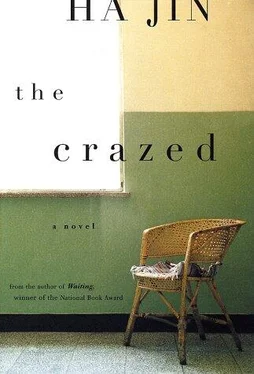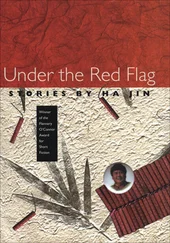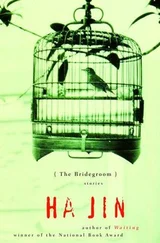I was making a fool of myself, because he knew those scenes by heart. A copy of Purgatorio was lying on his desk. He must read Dante every day.
“Where are we now?” he asked me.
“What do you mean?”
“Which one of the three worlds described by Dante are we in now? We’re certainly not in paradise, are we?”
Somehow a popular song came to mind, so I quoted its last line with a straight face, “Our life is sweeter than honey.”
He burst out laughing. “You have a sense of humor, Jian. That’s good. Humor can make one detached. I wish I had it.” Then his face went somber again. “We’re neither in paradise nor in hell. We’re stuck in between hell and purgatory, don’t you think?” He smiled enigmatically, chewing his lip.
“Maybe. I’ll think about it,” I mumbled, unable to understand his bizarre notion. I wanted to end our conversation there. There was enough Tang poetry for me to work at, and I had no need for such a huge Christian poem to clutter my mind. I turned my head. On the wall hung a painting Weiya had done for him. In it a tubby, smiley monk was eating a gourd ladle of figs while fanning his naked paunch, on which were stuck a few scraps of fig skin.
Mr. Yang resumed, “This is my favorite poem. It saved my life.”
“How?” My interest revived.
“When the Cultural Revolution broke out, I came under attack as a Demon-Monster because I had translated some foreign poems and once argued that Goethe was a great poet. Sometimes the Revolutionary Rebels on campus planted on my head a dunce hat with my family name written on it. Sometimes they tied a bucket filled with water around my neck to bend my body and keep my head low. Sometimes they made me kneel on a washboard. Even when my knees began bleeding, they wouldn’t allow me to get up. But during the torture I would recite to myself lines from The Divine Comedy. They could hurt me physically, but they could not subdue my soul. Whenever I closed my eyes, I saw the scenes in Inferno. If they forced me to open my eyes, I’d imagine that the crazed people below and around me were like the blustering evildoers, devils, and monsters cast into hell. They were cruel and desperate because they were hopeless. While reciting The Divine Comedy in my heart, I felt that my suffering was meant to help me enter purgatory. I had hope. Suffering can refine the soul. Beyond purgatory there’s paradise.”
“Are you a Christian?” I blurted out, unable to see why he had taken pains to memorize such a long poem.
“No, I’ve never been truly religious. But at that time, under torture, I often wished I were a Christian so that I could have prayed to God wholeheartedly. Religion is spiritual opium, as Marx has taught us. No doubt about that, yet once in a while human beings need some spiritual narcotics to alleviate pain. The flesh alone cannot sustain us. In any case, this poem helped me, comforted me, encouraged me, tided me over many moments when I thought of ending my life.” With a grimace he lifted his hand and clutched his throat, sticking out his fat tongue. He then picked up the copy of Purgatorio from his desk and waved it at me, as if to convince me of the boundless power the flimsy paperback possessed.
Now his body was confined to this hospital bed while his mind roamed the empyrean, as though the Christian divine spheres could also admit pagans as long as they had been humble and virtuous in their lives. I kept quiet, not to disturb his hallucinatory journey so that he could enjoy the bliss a little longer.
I turned a page of my dictionary and resumed reading while his mouth writhed and a smile broke out on his face. From time to time I’d watch him.
Outside, a siren started screaming. There must be a fire somewhere nearby. I couldn’t tell which direction the siren came from, because the mountain of anthracite outside the window had put me out of my bearings. As the siren squealed louder and louder, Mr. Yang stirred, whispering, “Fire, fire, that’s the holy fire. Burn them, burn those devils!”
I listened closely. He sighed, “Yes, fire and rose are one.” He opened his eyes and looked around. He noticed me and gazed at my face intently for a moment. Then he made an effort to turn to face the window, but he couldn’t move his left shoulder. I got up and went over.
“Give me a hand, please,” he said.
I lifted his back and made him sit up. Supporting his back with my right arm, I grasped the pillows and put them behind him. He seemed eager to talk, so I returned to the chair, ready to give him an ear.
But before he could start, somebody knocked on the door. I went to answer it. To my surprise, Vice Principal Huang’s white head emerged. Since Mr. Yang was hospitalized, no school official had ever come to see him. The tall vice principal took a step forward, holding a string bag of yellow apples, some of which had russet flecks on them. He wore a double-breasted jacket with peaked lapels, which was too large on him and made his triangular face appear thin and small. “How are you, Comrade Jian Wan?” he asked, his walleyes looking me in the face.
I was amazed he knew my name. “Fine, thank you for coming,” I said and stepped aside to let him in.
He went up to Mr. Yang. Although over sixty, he looked well preserved, his waist robust but not rotund, and his legs so thin that he was hipless. He said heartily to my teacher, “How are you doing, Old Yang? Do you feel better?” He patted Mr. Yang’s hand.
My teacher made no reply. The leader said again, “I came to see you. Look, I brought you some fresh fruit. How are you?” He lifted the apples up and put them on the bedside cabinet.
“I’m good, won’t die for a couple of hours,” Mr. Yang grunted. I was puzzled by his sullenness, wondering why he showed no respect for the vice principal.
Huang turned to me and put on a smile, saying, “I’m going to talk with your teacher.” I realized he meant I should make myself scarce, so I walked out and carefully closed the door.
I loitered in the corridor for a few minutes, then sat down on a long straight-backed bench. I was a bit groggy, my temples aching. The previous night I had pored over a textbook on dialectical materialism and hadn’t gone to bed until 3:00 A.M. Now, eyes closed and arms folded, I soon drifted off to sleep.
I had a bizarre dream, in which Meimei and I stayed in an inn at a sandy beach. I was sick with a stomachache, lying in bed and shivering all over. Wearing a white cap and a knee-length skirt, Meimei was cooking crucian carp soup for me on a small alcohol stove we had brought along. Five of its six wicks were afire, hissing softly as the flames licked the bottom of a stainless steel pot. Turning over the fat fish gingerly with a spatula, Meimei crooned a folk song in a soothing voice. Outside, on the bulging sea, a couple of gray sails glided almost motionlessly while a conch horn was tooting somewhere on the shore.
The soup was done. It looked milky and smelled like steamed mussel, but I was too sick to eat it by myself. Meimei tried to feed me with a spoon like a small ladle, which turned out to be too broad for my mouth. She piped into my ear, “Open wide, open wide, my little groom.” But my mouth was too narrow for the spoon, and a few drops of broth spilled on the front of my shirt. Tittering, she said, “You have such a tiny mouth, like a pretty girl’s.”
No matter how hard I tried, I couldn’t open my mouth wider, as if my lips had been partly sewn together. My tongue went numb and felt like a wooden stick. I was angry at myself, my heart kicking. I told her to put away the bowl and get into bed. She shed her shirt, poplin skirt, and anklets. She was now in red panties and a white cotton bra; a birth-mark the size of a mulberry was under her right breast. Her belly was almost flat; her hips were shapely, concave on the side, each hollow resembling a giant dimple. She lay down and nestled against me. As she touched my forehead, I shuddered — her hand was ice-cold.
Читать дальше

![Lao Zi - Dao De Jing [Tao Te Ching] (english)](/books/3890/lao-zi-dao-de-jing-tao-te-ching-english-thumb.webp)
![Lao Zi - Dao De Jing [Tao Te Ching] (chinese)](/books/3891/lao-zi-dao-de-jing-tao-te-ching-chinese-thumb.webp)
![Lao Zi - Dao De Jing [Tao Te Ching] (espanol)](/books/3892/lao-zi-dao-de-jing-tao-te-ching-espanol-thumb.webp)







